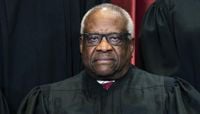Ten years after the landmark U.S. Supreme Court decision in Obergefell v. Hodges, which legalized same-sex marriage nationwide, the debate over marriage equality is once again front and center—both in the United States and abroad. As legal, political, and social battles rage on, communities across the country are reflecting on a decade of rapid change, renewed activism, and ongoing uncertainty about the future of marriage rights.
The ruling in Obergefell v. Hodges on June 26, 2015, was a watershed moment for LGBTQ+ Americans. For many, it marked the culmination of years of struggle and the beginning of a new chapter. But for others, it represented a departure from tradition and sparked deep concerns about the direction of American society. According to The Christian Post, some conservatives argue that the decision led to what they see as the unraveling of the traditional definition of marriage, with far-reaching consequences for the family and society at large. The article contends that, “when the institution of the family is usurped at its very foundation—marriage between a man and a woman—chaos and disorder ensue.”
This perspective, shared by many on the religious right, frames the past decade as a period of increasing societal confusion. Critics of the ruling argue that removing the gender distinction from marriage sent a message that “gender doesn’t matter, period,” and claim it contributed to broader acceptance of gender fluidity and non-traditional family structures. The same article points to developments such as men participating in women’s sports, expanded rights for transgender individuals, and the normalization of what it describes as “intentionally motherless or fatherless homes.” The author, Emily Wood Hawley, asserts that, “the fight to preserve marriage as God designed it absolutely matters,” and warns that rejecting traditional marriage “quickly devolves into societal ruin, and children are always the first victims and the most affected.”
At the heart of this debate is the question of religious liberty. The case of Kim Davis, a Kentucky county clerk who was jailed after refusing to issue marriage licenses to same-sex couples post-Obergefell, remains a flashpoint. As of October 1, 2025, Davis’s case—Davis v. Ermold—could be before the Supreme Court, potentially reopening the issue of marriage equality and sending it back to the states. For advocates of traditional marriage, this case is seen as a chance to “topple Obergefell v. Hodges and send the issue of marriage back to the states.” Hawley writes that, “if and when this occurs, Christians must stand ready to defend the institution of marriage and not shrink back in leading the culture war to preserve society’s most foundational institution.”
On the other side of the debate, LGBTQ+ advocates and allies see the past decade as a time of hard-won progress and persistent threats. In Ohio, Equality Ohio—a nonprofit founded in 2005 after the state’s ban on same-sex marriage—recently celebrated its 20th anniversary. Leaders of the organization, speaking to NBC4’s “Out in Ohio,” highlighted both their achievements and the renewed urgency of their mission. Dwayne Steward, Equality Ohio’s executive director, reflected on the group’s origins: “A lot of people were terrified or upset after that [2004 ban]. Equality Ohio was formed to kind of fight back.”
Initially focused on marriage rights, Equality Ohio has since broadened its mission to include legal advocacy, lobbying against anti-LGBTQ+ legislation, and providing direct legal services. Steward noted that their statewide legal clinic has served more than 1,000 LGBTQ+ families. “We’ve launched a legal [clinic] to make sure they have protections on an individual level,” he said. “We’re also at the Statehouse, working with legislators to try to keep anti-LGBTQ+ laws from being passed.”
Despite earlier successes in holding the line against discriminatory legislation, Steward acknowledged that recent years have brought new challenges, including laws restricting gender transition treatment for youth and renewed speculation about the future of marriage equality at the federal level. “We have to continue to fight,” he said. “Our role at Equality Ohio is really to organize and make sure that people remain protected, that we are continuing to make sure that no matter what happens at the federal level, the people of Ohio still are able to move forward and still have the protections for their families and for their unions.”
Equality Ohio marked its anniversary on October 17, 2025, with an event themed “Celebrating Our Past, Reclaiming Our Future.” Kieran Robertson, the group’s director of development, emphasized the importance of both celebration and resistance. “The narrative of hopelessness and fear is a dangerous one,” they said. “By celebrating organizations like ours, we see that we have a proactive path forward. We’re doing something, we have power together.”
The organization’s founding organizer, Tom Grote, recalled the early days of Equality Ohio: “Many of us got together in the basement of the King Avenue United Methodist church here in Columbus. We were trying to figure out what to do. That’s where Equality Ohio was born.” Reflecting on the 2015 Supreme Court decision, Grote said, “We were dreaming about what could be. But, we would have never dreamt that only 10 years later, we’d have marriage equality in the state.” Now, with marriage rights once again under scrutiny, Grote stressed the importance of continued vigilance. “It’s hard to believe … that marriage could be up for debate again,” he said. “But we have to remember that our lives matter and we deserve those rights, and we can’t just rest on our laurels here, we have to stand up, we have to come together.”
For many families, the practical implications of marriage equality are deeply personal. Grote, who is married with two daughters, described how the ruling allowed him and his husband to co-adopt their children and secure healthcare benefits. “That’s what it did for us. It made us. It made the ability for us to have healthcare benefits and secure our children’s lives. That ain’t going away, folks.”
Looking ahead, both sides of the debate are preparing for what comes next. Equality Ohio is set to launch a new strategic plan in 2026—a “roadmap back to equality”—focused on local, state, and legal advocacy. Meanwhile, conservative activists are watching the Supreme Court closely, hoping for a shift that could return the question of marriage to the states. The stakes are high, and the outcome remains uncertain.
Beyond the United States, the global landscape around same-sex partnerships is also evolving. In Japan, the government announced on September 30, 2025, that it would recognize same-sex couples as being in de facto marriages under nine additional laws and ordinances, including the disaster condolence grant law, according to Jiji Press. This follows a March 2024 Supreme Court ruling recognizing same-sex couples under the crime victim benefit law and a January 2025 decision to recognize such partnerships under 24 other laws. However, the Japanese government maintains that same-sex partners are still not covered under 120 laws, including those related to taxes and social security. This piecemeal progress illustrates the complexities and incremental nature of change in many societies.
As the world marks a decade since Obergefell, the debate over marriage equality is far from settled. Whether in the courts, the legislatures, or the streets, advocates and opponents alike are digging in for the next chapter of this ongoing struggle—one that will shape families, communities, and nations for years to come.





